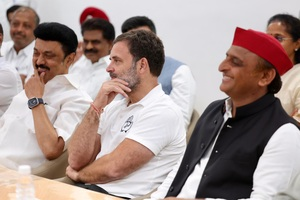Bihar mandate leaves Congress on weak wicket with regional allies for 2026 poll season
By IANS | Updated: November 15, 2025 17:40 IST2025-11-15T17:36:27+5:302025-11-15T17:40:07+5:30
New Delhi, Nov 15 For the Congress, the 2025 Bihar Assembly election result has again underscored structural weaknesses ...

Bihar mandate leaves Congress on weak wicket with regional allies for 2026 poll season
New Delhi, Nov 15 For the Congress, the 2025 Bihar Assembly election result has again underscored structural weaknesses that will now limit the party high command's leverage with regional allies in the upcoming high-stakes Assembly elections in four states and a Union Territory next year.
The national leadership’s mobilisation, including high-profile visits and yatras, has failed to convert into seat gains when local organisations are weak and regional satraps dominate ground-level bargaining and candidate selection.
Recurring poor showings signal to state leaders and regional allies that the high command cannot guarantee electoral payoff, which erodes the moral and bargaining authority the central leadership needs to impose discipline or anoint candidates. Thus, the result strengthens the bargaining hand of regional party leaders, where satraps already enjoy autonomy rooted in their state-level clout.
Bihar has just amplified that dynamic.
In West Bengal, the Congress will have to fall in line with the demands of the state unit, according to senior journalist Biswajit Bhattacharya. Some reports earlier suggested that the high command introduced a change in the highest echelons of the state unit to placate ruling Trinamool Congress (TMC) supremo Mamata Banerjee. Critics claim that the former state chief, Adhir Ranjan Chowdhury, had to make way for Subhankar Sarkar for his severe anti-Mamata Banerjee statements.
Sarkar, considered a "soft face", is seen as malleable and accommodating. However, Banerjee has given enough indications that she does not wish to accommodate any national allies in state politics. The Trinamool supremo, say insiders, shares a somewhat cordial relationship with Sonia Gandhi but appears to exhibit a cold attitude towards her son, Rahul Gandhi.
The Left, with which the Congress has had an electoral alliance in the state, is also said to be contemplating a poll foray on its own after facing a wipeout holding the grand old party’s "hand". Congress old timers agree that they indeed may face whichever way, but may lose.
In Assam, Bihar’s collapse will likely push Assembly-level allies to demand more autonomy in seat allocation and campaign management. The Badruddin Ajmal-led All India United Democratic Front (AIUDF) and the Congress forged selective alliances primarily to consolidate Muslim voters, but these partnerships have often been contentious and yielded mixed electoral outcomes.
Meanwhile, Tamil Nadu’s political arena is deeply regionalised and dominated by strong Dravidian parties that view the Congress as an occasional ally rather than a pole of attraction.
Bihar’s outcome reinforces the calculus that Congress is a junior partner, where the ruling Dravida Munnetra Kazhagam (DMK) and other regional actors will leverage that perception to demand operational freedom during campaigns and to control seat distribution.
The Congress no longer remains in a position to bargain for more seats with the DMK, nor make confident overtures at actor-turned-politician Vijay’s Tamilaga Vettri Kazhagam (TVK).
DMK leaders are already wary of such outreach. In a recent public address, Tamil Nadu Deputy Chief Minister Udhayanidhi Stalin’s remarks over the "hand" not leaving "us" have set the grapevines buzzing with reference to the Congress’s political symbol.
With the Bihar election results weighing it down like the proverbial albatross, the Congress can no longer afford an adventure beyond the DMK juggernaut and agree to the larger partner’s conditions.
In Kerala, according to political analyst T.J. Srilal, the BJP is yet to find a foothold, and the 2006 polls will again be a direct contest between the ruling Left Democratic Front (LDF) alliance and the Congress-led United Democratic Front (UDF).
The Congress is already facing a problem aplenty with plenty of leaders aspiring to be the Chief Minister. Party MP Shashi Tharoor dropped some hints this July when he shared a survey by an independent agency which reflected a strong anti-incumbency wave in the state, and showed him being named by 28.3 per cent of respondents as the Opposition bloc’s Chief Ministerial candidate.
Incidentally, since the time Tharoor threw his hat in the ring against Gandhi’s choice of Mallikarjun Kharge as candidate for the party President’s post, and his subsequent public endorsements of certain policies of the Union government, his relationship has been under strain with the Congress high command.
Taking a cue from that strain, state Congress leader K. Muraleedharan had then reacted by saying that Tharoor should first decide "which party he belongs to".
Political observers like Srilal claim that other leaders like party General Secretaries Ramesh Chennithala and K.C. Venugopal are also among such aspirants.
Disclaimer: This post has been auto-published from an agency feed without any modifications to the text and has not been reviewed by an editor
Open in app